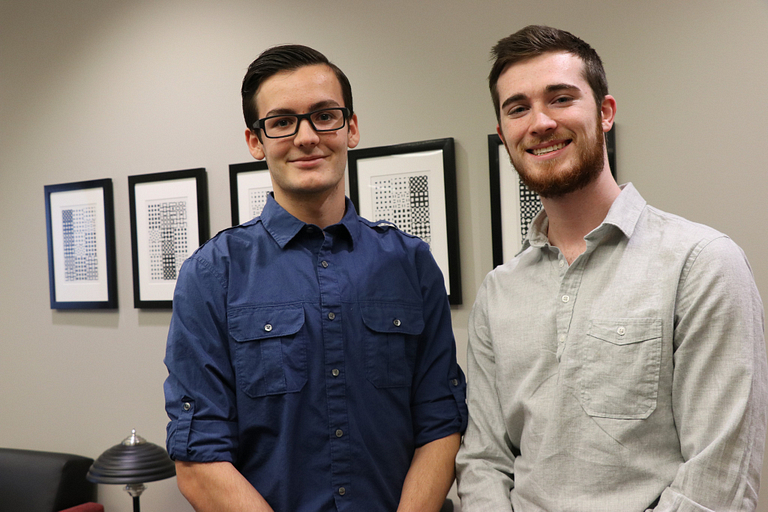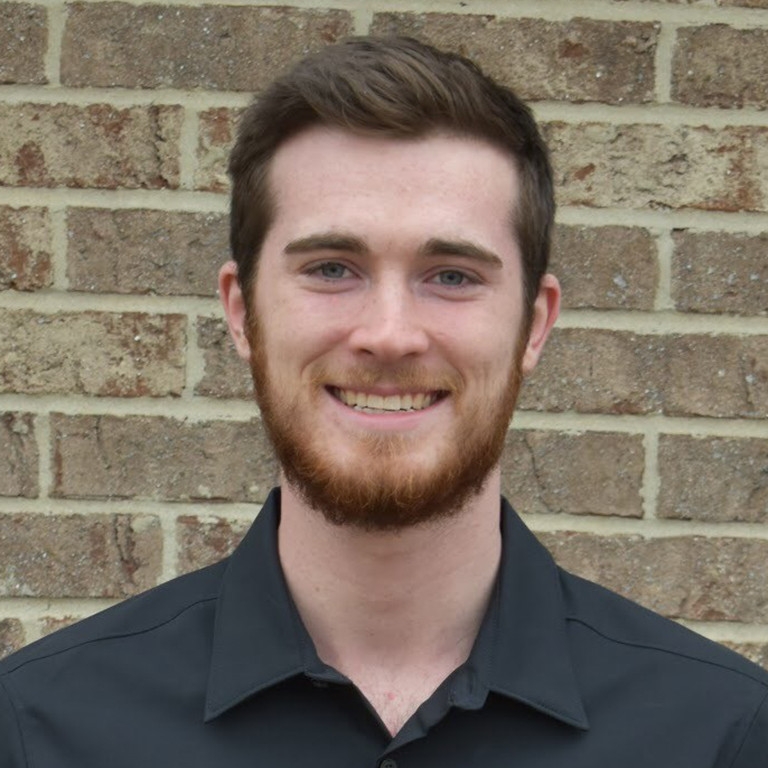
There’s more to artificial intelligence – AI – than robots taking over the world. Zachary Balda and Brandon Boynton say what they do is machine learning, a subset of AI. Word choice aside though, it kind of sounds like they’re helping machines replace the need for a human brain.
Both IUPUI sophomores studying computer science, Balda and Boynton, along with Purdue student Zachary Walters, created Vemity, a company that supports businesses lacking the highly trained manpower or capital to invest in AI. In its current phase, Vemity targets startups and other small companies ranging from five to 50 employees.
“They can use our system as a service model rather than doing it in-house,” said Boynton of leveraging AI. “They can create that model through our platform, and their developers can do it. They don’t need to hire a data scientist to do it.”
Boynton explained Vemity’s capabilities through the example of one of the companies it’s currently courting.
“Essentially, they keep track of user engagement: ‘How likely is it that this user is going to continue using this service, and how likely are they to quit?’ Right now, they take all the data, give it to the owner of the service, and say, ‘Here you go. Figure it out.’ So they do the data mining, but they don’t really tell their customer, ‘Here’s the likelihood that this user will do this or this.’”
INDIANAPOLIS – Two IUPUI students have launched Vemity, a high-tech business-to-business startup to help companies leverage the data they collect.
Vemity CEO Brandon Boynton says the company’s artificial intelligence-as-a-service is versatile enough to benefit any company with an internet-enabled product.

“It can be used to discover new revenue streams and make companies more competitive,” he said. “Companies can use predictive intelligence to better know what their users will do next, or use AI with their products to add new features and abilities.”
Boynton said a couple of challenges prevent the mass adoption of artificial intelligence.
“First, hiring a data scientist can be expensive. The potential increased revenue may not be enough for company leaders to consider the hire profitable,” he said. “Second, if a company doesn’t have a data scientist, its software developers may not be able to extend their abilities into the realm of machine learning. Vemity is positioned to fill the gap for companies that want to use AI but do not have the resources.”
Boynton said other companies that offer artificial intelligence-as-a-service focus only on providing enterprise-level platforms to large companies. He and his colleagues at Vemity are reaching out to CEOs, chief technology officers and software developers at small and medium-sized companies to empower them to use AI.
“When my colleagues at Vemity and I meet with CEOs and CTOs, we want to show how we can assist them in turning their far-off data science plans into a reality. We want to spend a lot of time with software developers, too: attending conferences, presenting and teaching at meetup groups,” he said. “For Vemity, cultivating relationships with the developer community and gaining its support will set us apart from other companies.”
Vemity has begun its sales phase, and its founders have spoken with Indianapolis- and Chicago-area investors.
“Once our revenue reaches a point where our company valuation is where we want it, we will be launching our seed round,” Boynton said. “Our goal is to raise enough money to hire three to five employees and scale beyond Indianapolis.”
Boynton and Chief Technology Officer Zachary Balda are enrolled in the IUPUI Honors College. Boynton is a sophomore majoring in applied computer science; Balda is a junior studying computer science. Purdue University student Zachary Walters is the company’s head developer.
Enter Vemity, which provides the tools for that company to customize the platform to figure out that likelihood. It’s a plug-and-play model: Here are the pieces. As a company, you can now easily put them together in a way that opens revenue streams and makes you increasingly competitive in your market.
How Boynton and Balda got to this point is almost cliché. They really were just a couple of college kids tossing around ideas in their dorm room. While building AI systems in class last spring, the roommates realized that much of the technology is repetitive and can be automated. Then they were inspired by a machine that can diagnose astigmatism with greater accuracy than most ophthalmologists, and Vemity was born.
They’ve worked to keep it a student-driven venture as well, often using the Computer Science Club as a resource for market analysis and support. Once they start scaling their business (after six months of development, Vemity just recently entered its sales phase), they hope to tap into the talent pool at the Department of Computer and Information Science. They’d love for Vemity’s future developers and data scientists to be fellow IUPUI students.
Balda and Boynton have an aggressive timeline to get to the point where they can start hiring employees. They currently have a few dozen users but hope to show proof of concept by signing contracts with businesses in Indianapolis in the coming months. Within a few years, the plan is to “be a prime acquisition target” for the Amazons and Googles of the world, according to Boynton.
So how do two 20-somethings launch a business while also maintaining a full class schedule in the School of Science and fulfilling requirements as Chancellor’s scholars in the Honors College?
“It’s … difficult,” said Balda, thinking for a moment about how to describe the workload. “You just try to put in as many hours as you can. You don’t get a whole lot of sleep.
“I would say that it’s just a lot. You divide it up into all the different things you need to focus on, like development, customers, the business side,” he continued. “You realize you have only three people, and you divide up that time, and time management becomes very important.”
Boynton, already a veteran at business development having created two companies, one an app to report bullying in high school and another a consulting group with Walters that included the U.S. Chamber of Commerce on its client list, responded a bit more lightheartedly: “You get to eat meals, and that’s fun!”
Joking aside, both agree without hesitation that they would accept the challenge again.
“For a long time, when I was doing the consulting thing, I had a lot of people asking me, ‘Do you even want to go to college?’ And I was like, ‘Yeah, I need the degree.’ I think that kind of implanted in my mind – that I would pursue the degree unless something else came up,” Boynton said. “I just think we lucked into being roommates, and I corrupted him.”
Said Balda, “I didn’t imagine myself working for a startup, but I have always been interested in AI. I think this is a really great fit.”
The Vemity team hopes they’ll be a really great fit for growing businesses in Indiana as well. “You’ve got to have some ambition,” Boynton said.
Just as long as that ambition doesn’t lead to machines taking over mankind.

